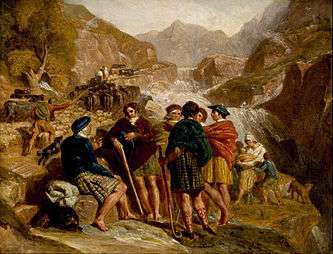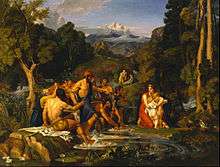Joshua Cristall

Joshua Cristall (1767–1847) was an English painter.[1] For a time he was president of the Society of Painters in Water-Colours, a medium in which he showed a pleasing freedom and simplicity of style.
Life

Cristall was born at Camborne in Cornwall. His mother shared with and inspired in her son a taste for classic art. His father was Scottish and bitterly opposed to his son's artistic tastes, but his mother secretly aided him in his struggles to study art. He was joined at school in London by his sister Ann Batten Cristall, who was to become a poet and a schoolteacher.[2] He was first apprenticed to a china dealer at Rotherhithe, but after finding that business too irksome, he left for the Staffordshire Potteries, where he found employment as a china painter. Finding that job too monotonous, he went to London, and commenced a life of great privations and hard efforts to study the fine arts. During this period of his life, he reportedly seriously injured his health by trying to live for a year on just potatoes and water. Aided in secret by his mother, he persevered in his endeavours, and finally gained admission to the school of the Royal Academy, where he made rapid progress. He became personally known to Dr. Monro and visited his house, where he met the rising water-colour artists of the day.

In 1805, he became a founding member of the Society of Painters in Water-Colours and made the first public exhibition of his works; he continued to do so for many years. He later became president of the Society and was always a warm and active supporter of the Society. In 1822, with his health in decline, Cristall went to Goodrich on the Wye, where he had already bought a house, and where he spent many happy years until the loss of his wife, who died in 1840, drove him again to London, where he died in 1847. His body was carried to Goodrich, and buried by the side of his wife, at his own earnest request.
Works
Cristall's usual subjects in his early years were classical figures with landscapes, such as his Lycidas, Judgment of Paris, Hylas and the Nymphs, and Diana and Endymion, but he afterwards produced genre subjects and rustic groups. Around 1813, he tried portrait painting, generally small full-lengths with landscape backgrounds, in which he used no body-colour. As a watercolour painter, Cristall will always hold an honourable position from the freedom and simplicity of his style and manner of execution. Five of his drawings (including The Young Fisher-Boy and The Fish Market on Hastings Beach) are in the South Kensington Museum. Cristall was one of the early members of the Sketching Society; he also furnished some of the classical figures in Barret's landscapes, as well as some of the groups in George Fennell Robson's Scotch Scenery.
Notes
- ↑
 "Cristall, Joshua". Dictionary of National Biography. London: Smith, Elder & Co. 1885–1900.
"Cristall, Joshua". Dictionary of National Biography. London: Smith, Elder & Co. 1885–1900. - ↑ Richard Greene: "Cristall, Ann Batten (bap. 1769, d. 1848)", rev. Leya Landau. Oxford Dictionary of National Biography (Oxford, UK: OUP, 2004). Retrieved 19 October 2015. Pay-walled
References
- This article incorporates text from the article "CRISTALL, Joshua" in Bryan's Dictionary of Painters and Engravers by Michael Bryan, edited by Robert Edmund Graves and Sir Walter Armstrong, an 1886–1889 publication now in the public domain.